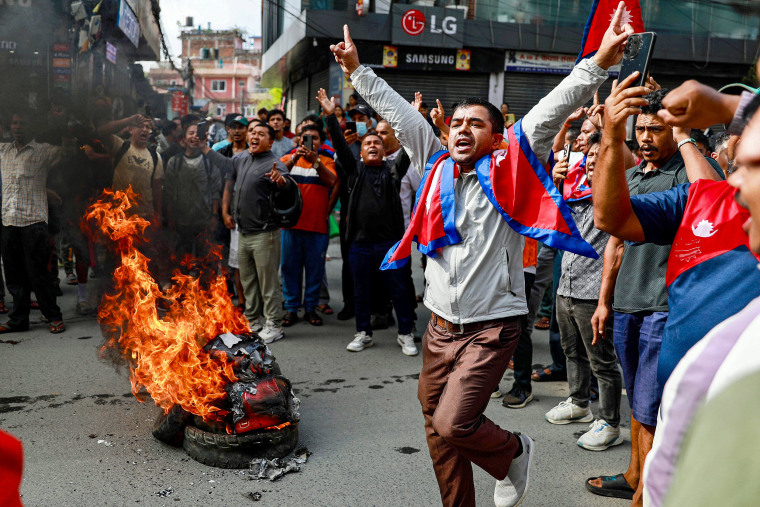Nepali Prime Minister K.P. Sharma Oli resigned Tuesday, Reuters reported, after days of mass protests over a social media ban and official corruption in the Himalayan nation culminated in the torching of top leaders’ homes, as well as the Parliament building.
The country’s main airport in Kathmandu, the capital, was also closed amid security concerns as so-called Gen Z protesters in multiple cities defied an indefinite curfew and clashed with police. On Monday, at least 19 people were killed when police opened fire on the crowd during a mass demonstration that included an attack on Parliament.
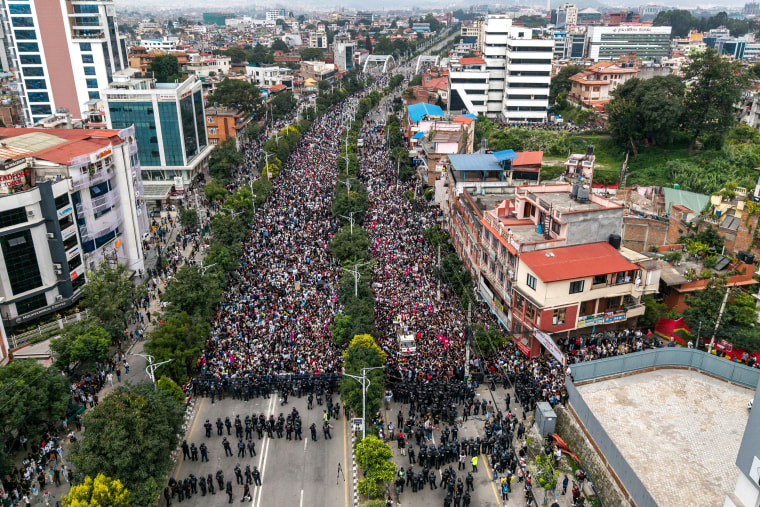
A spokesperson for Tribhuvan International Airport told NBC News that most flights still in the air were being diverted.
“There is a lot of smoke in the vicinity of the airport,” the spokesperson said.
Videos shared on social media and verified by NBC News showed the Parliament building burning Tuesday.
“Yesterday it was just Gen Z’s protest and we didn’t participate, because it was just limited to people aged 28 years or younger,” said Chewan Rai, 34, a policy researcher who was at Parliament.
But after the deaths Monday, Rai said in a voice message, it was difficult to sleep with the feeling “that the government that we elected can do so much harm without any sense of empathy or care to these young people.”
The houses set on fire by the demonstrators included those of Sher Bahadur Deuba, leader of the largest party, Nepali Congress; President Ram Chandra Poudel; Home Minister Ramesh Lekhak; and former Prime Minister Pushpa Kamal Dahal, according to The Associated Press. Local media reported that the army was evacuating ministers from their residences using helicopters.
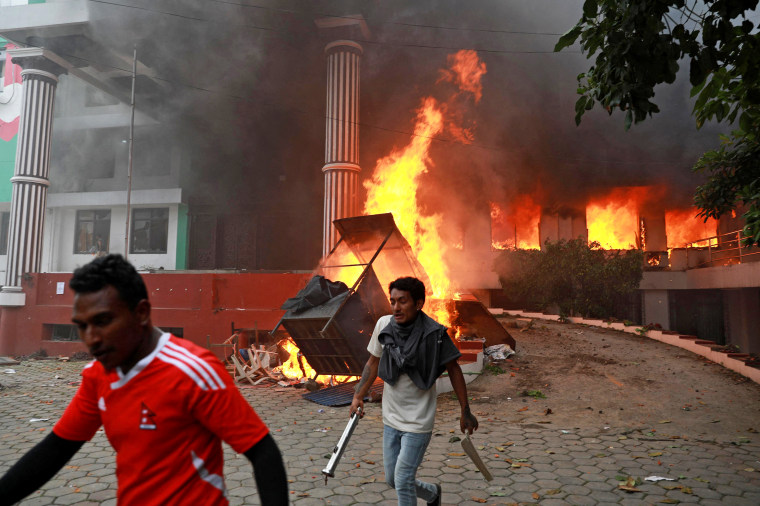
Lekhak, the home minister, also resigned late Monday after an emergency Cabinet meeting.
Sahil Singh, 29, who runs a cybersecurity business based in Kathmandu, said that the movement was about stopping corruption and that Oli's resignation was unlikely to placate protesters.
“I want a real change after this, I mean a good system and government,” he said in a phone interview. “Right now the whole country is in chaos.”
Singh said people started pouring into the streets around 7 a.m. Tuesday (9:15 p.m. ET Monday), “without anybody in particular leading the protests.” By 9 a.m., he said, the crowds had gotten even bigger.
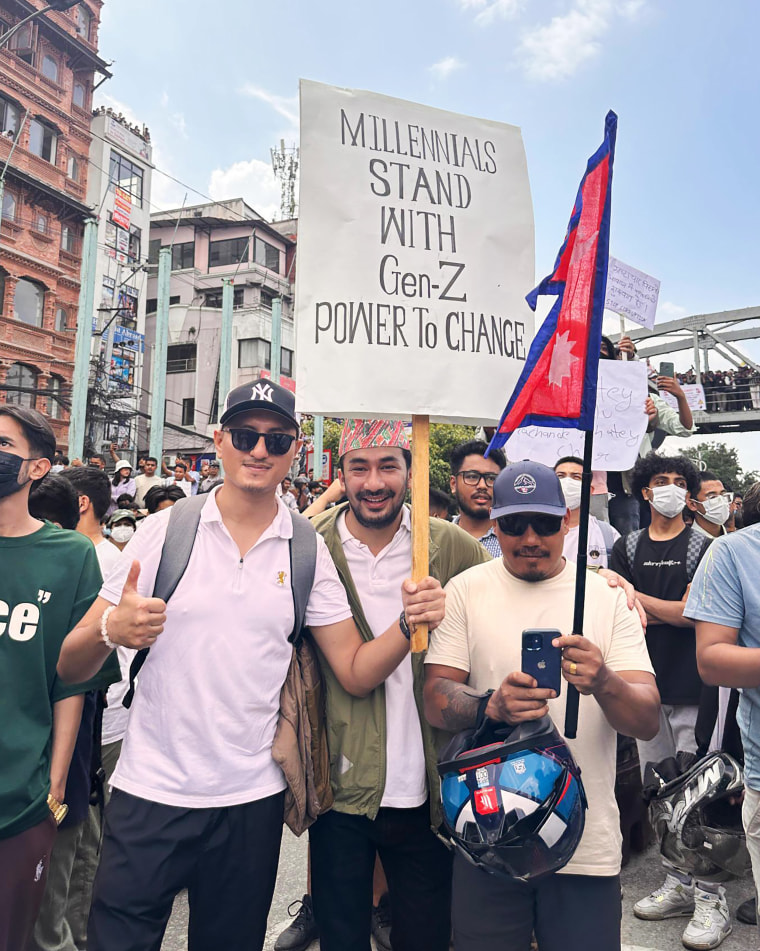
“People were angry against the politicians,” he said after having witnessed buildings being burned.
The protests began in opposition to a ban on more than two dozen social media platforms that was imposed last week, but they have since expanded to include general frustration with corruption.
On Monday, the U.N. Human Rights Office urged a “prompt and transparent investigation” into the killings and injuries of protesters.
“We have received several deeply worrying allegations of unnecessary or disproportionate use of force by security forces during protests organized by youth groups,” spokesperson Ravina Shamdasani said in a statement.
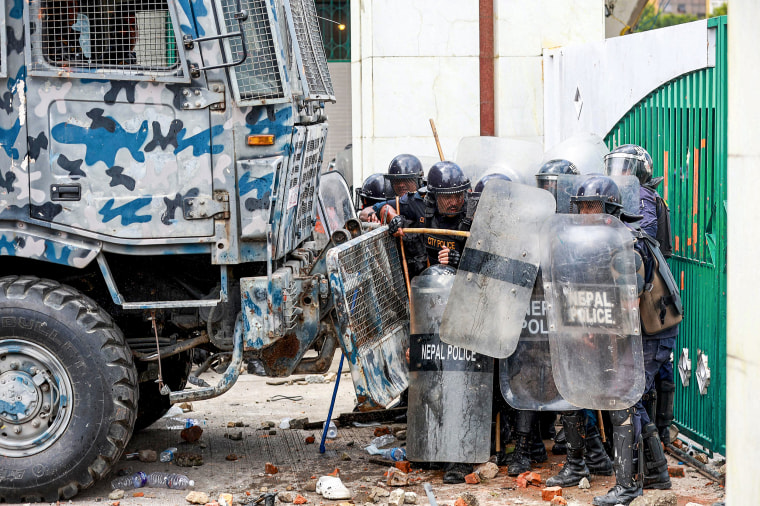
Oli said Monday that the protesters’ deaths and injuries would be investigated, that the families of those killed would be compensated and that those who were injured would receive free treatment.
The government of neighboring India, where there are hundreds of thousands of Nepali migrant workers, said Tuesday that it was “deeply saddened by the loss of many young lives” and urged restraint and the use of peaceful means and dialogue.
The government of Nepal, a democracy of about 30 million people that abolished its monarchy in 2008, said earlier Tuesday that it was lifting its social media ban, which included some of the world’s largest platforms, including Facebook, X and YouTube.
Officials said the companies had failed to comply with a new requirement to register and submit to government oversight under legislation aimed at ensuring the platforms were “properly managed, responsible and accountable.” Rights groups have criticized the move as a way for the government to restrict freedom of speech and silence dissenters.
The rally Monday has come to be known as the “Gen Z” protest, in reference to the generation of people born from 1995 to 2010 who are heavy social media users.
TikTok, Viber and three other platforms that registered have continued to operate uninterrupted, according to the AP. TikTok was previously banned in Nepal in 2023 for disrupting “social harmony,” but the ban was lifted at Oli’s instruction last year after the company agreed to comply with local laws, including a 2018 ban on all pornographic sites.
Oli, 73, had served as prime minister four different times, including from 2015 to 2016 and 2018 to 2021. He was briefly reappointed in 2021 and began his most recent term in July 2024, becoming the fifth prime minister in five years.
